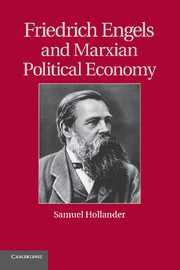Book contents
- Frontmatter
- Contents
- Preface
- Prolegomena
- 1 Engels's Early Contribution
- 2 The Surplus-Value Doctrine, Rodbertus's Charge of Plagiarism, and the Transformation
- 3 Economic Organization, and the Price Mechanism
- 4 “Revisionism” I. Constitutional Reform versus Revolution
- 5 “Revisionism” II. Social Reform
- 6 The Engels–Marx Relation
- 7 A Methodological Overview
- Epilogue: The Immediate Legacy
- Appendix A Prolegomena: A Brief Chronology
- Appendix B Chapter 5
- Appendix C Chapter 7
- Bibliography of Works Cited
- Index
- Titles in the series
2 - The Surplus-Value Doctrine, Rodbertus's Charge of Plagiarism, and the Transformation
Published online by Cambridge University Press: 01 June 2011
- Frontmatter
- Contents
- Preface
- Prolegomena
- 1 Engels's Early Contribution
- 2 The Surplus-Value Doctrine, Rodbertus's Charge of Plagiarism, and the Transformation
- 3 Economic Organization, and the Price Mechanism
- 4 “Revisionism” I. Constitutional Reform versus Revolution
- 5 “Revisionism” II. Social Reform
- 6 The Engels–Marx Relation
- 7 A Methodological Overview
- Epilogue: The Immediate Legacy
- Appendix A Prolegomena: A Brief Chronology
- Appendix B Chapter 5
- Appendix C Chapter 7
- Bibliography of Works Cited
- Index
- Titles in the series
Summary
Introduction
This chapter addresses Engels's claim in the Preface to Capital 2 (1885), in response to the charge of plagiarism by Karl Rodbertus, that the Marxian theory of surplus value based on labor power was already to be found in the Poverty of Philosophy (1847) and in “Wage Labour and Capital” (1849; see Prolegomena, p. 13). We encounter the complexity that in his Introduction to the 1891 edition of the latter document and in the correspondence of 1893, Engels seems to dilute this claim and postdate Marx's full comprehension of the surplus-value doctrine to about 1859. However, Engels's case actually turns out to be stronger than he realized: Not only does Marx spell out the essentials in 1849, bar the formal labor-power notion, but the Grundrisse (1857–8) – never seen by Engels – contains a most impressive formulation taking full account of labor power. If we then accept further Engels's affirmation that Marx was unfamiliar with Rodbertus until “around 1859,” the latter's charge collapses.
Even so, what precisely did Rodbertus have to say regarding the source of surplus value? I shall demonstrate that the formulation in Rodbertus from 1851 is almost identical with that of Marx, as Böhm-Bawerk and others – not only Rodbertus himself – insisted. Engels's approval of its “ironic dismissal” by Marx (MECW 36: 12) is an unjustified reaction. I also take account of Rodbertus's 1842 analysis.
I then review Engels's further efforts to undermine the significance of Rodbertus's contribution by focusing on its unoriginality; and his insistence, by way of contrast, on “labor power” as Marx's main innovation.
- Type
- Chapter
- Information
- Friedrich Engels and Marxian Political Economy , pp. 87 - 124Publisher: Cambridge University PressPrint publication year: 2011



